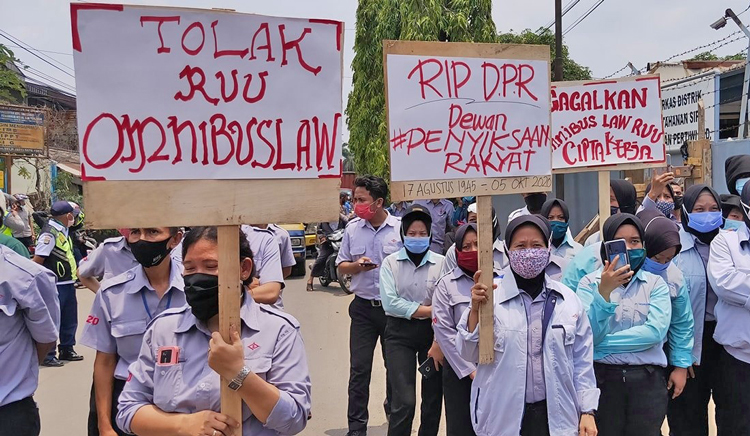SYDNEY — Hundreds of thousands of workers and students took to the streets across Indonesia Oct. 5 to protest the passage of anti-labor legislation that day. Dubbed the “Omnibus Law,” it amends more than 70 existing laws, including ones that protected wage workers.
“It is clear it is anti-worker legislation. It will replace the current labor law, which was won through struggle,” Listyowati from Kalyanamitra, a Jakarta-based women’s organization, told the Militant by phone. She pointed out the example of the removal of limits on how long workers can be employed as contract workers. “We fear that some workers may end up being casual workers for life,” she said.
The bill was pushed through by the administration of President Joko Widodo, who claims the law is aimed at creating jobs by cutting red tape, easing restrictions on foreign investment and improving labor “competiveness” — a code word for eliminating labor protections. Indonesia is in the midst of its worst economic downturn in two decades.
There were 7 million unemployed even before big pandemic layoffs of 2.8 million workers, especially affecting the tourist industry. Government-ordered lockdowns have hit street vendors, domestic workers and day laborers particularly hard. Over half of the workforce in Indonesia is estimated to work in this “informal” sector, which had few legal protections even before passage of the new law.
The main Indonesian trade union federations called a three-day national strike Oct. 5 to protest the bill. Contingents of workers marched in provinces across the country and were met with water cannons and tear gas. Over 3,800 protesters, including strikers, were arrested.
Actions against the law have continued. The unions are demanding parliament revoke the law and at the same time called for an 8% increase in the minimum wage.
“What workers hate the most is that the wages will be set by hourly rate instead of a monthly rate and that employers will not be required to pay severance pay,” Surya Anta, a human rights activist and former political prisoner, told the Militant from Jakarta. Switching to an hourly rate will mean workers will lose holiday pay and other benefits, he said, adding that under the new law bosses will more easily be able to fire workers.
“Women,” Listyowati told the Militant, “get laid off first because they are not treated as the main wage earner.” Under the new law maternity leave for wage workers will no longer be guaranteed, she said. The overwhelming majority of women in Indonesia are contract or “informal” workers.
A solidarity rally was held outside the Indonesian Consulate in the Maroubra suburb of Sydney Oct. 9. Members of the Maritime Union of Australia joined the action to show their support for workers in Indonesia resisting the Omnibus Law.


